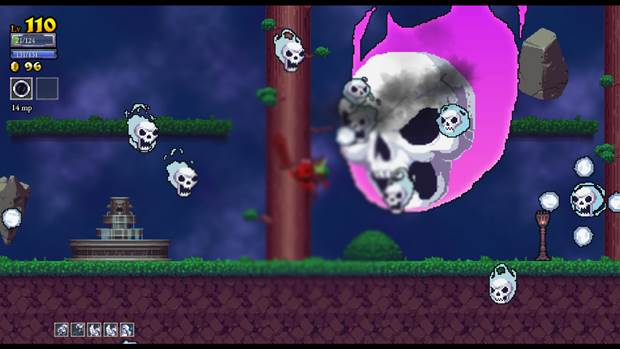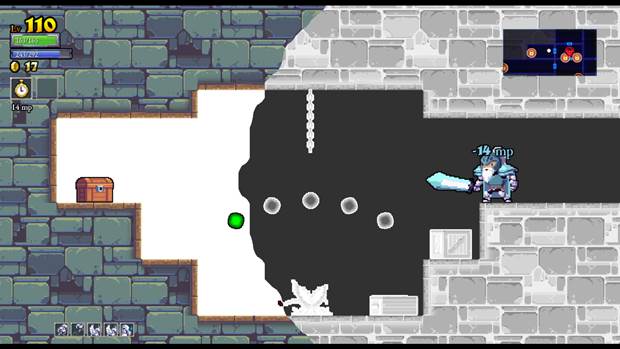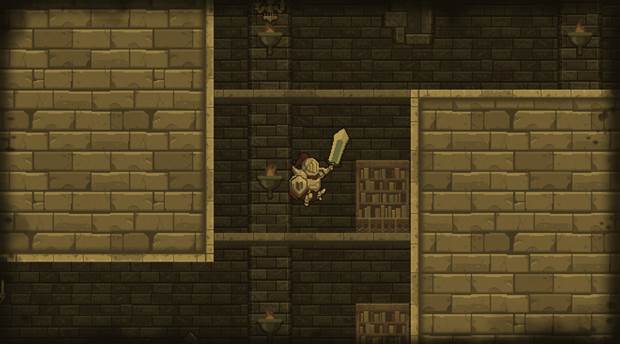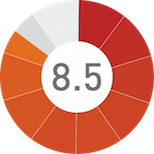
In the past, rogue-like experiences have never been quite my thing. My inner child cringes at the thought of a perma-death scenario in games like Diablo, and no amount of anime moe goodness seen in like say, Izuna: Legend of the Unemployed Ninja, is good enough to hold me for too long.
Despite that – two years ago, I became captivated by Edmund McMillen’sThe Binding of Isaac. It was essentially a rogue-like take for the original, over-the-head perspective gameplay that I came to love in The Legend of Zelda series, with some disturbing imagery to throw in for good measure. You could pretty much call these experiences “rogue for babies,” but I can totally get behind the idea of starting over in a game that closely mimics titles from the 8-bit or 16-bit generation.
Rogue Legacy by Cellar Door Games is kinda like, and then some. It draws heavy inspiration from the Castlevania series, particularly those games which were inspired by Metroid’s non-linear approach to map design, and runs even more wild with it. You start off as a knight who enters a castle, and goes through a series of randomly assorted rooms, filled with obstacles and enemies who are a bit annoying to pick off at first.
"Feeling a bit nostalgic? Here's a Gameboy-like monochrome layer to go along with that! It’s silly, but in a game where the point of progressing requires you to perish anyway, I didn’t mind it all that much."
However, once your knight falls for the first time, does the core elements of the game start to show itself. Rogue Legacy presents to you an option to choose three different “children” (can be male or female, and they’ll even have sexual preferences!) who have inherited your family’s previous quest, as well as possess any equipment or riches they’ve left behind in the wake of their previous death. Let’s leave aside how exactly they may have been able to acquire these items without re-entering the castle first.
Carried-over loot isn’t the only thing that differentiates Rogue Legacy from other rogue-lites. The three new character choices provided to you at the start of a fresh raid will carry unique classes and traits, which are randomly decided. Traits, of which have absolutely nothing to do with the class you choose, but will play on more of the genetic deficiencies that your newly-created knight was born with.
These traits will actually affect your playthroughs by bestowing features, such as having dwarfism and becoming small enough to access hidden passages. Some traits on the other hand, will be played for laughs and can even negatively impact you. For example, if your knight is suffering from vertigo, your entire screen will be flipped on you. Feeling a bit nostalgic? Here’s a Gameboy-like monochrome layer to go along with that! It’s silly, but in a game where the point of progressing requires you to perish anyway, I didn’t mind it all that much.
"Combat in itself isn't terribly deep, but offers a good variety of options and feels quite satisfying thanks greatly to the easy-to-grasp controls. "
This, combined with the varied classes you’ll acquire and unlock by spending your hard-earned gold on the skill tree, which is further coupled with the random nature of the room layouts go to make Rogue Legacy one of the more strangely addictive games I’ve played in some time. The first few hours can make you feel rather inadequate and weak.
Once you’ve become familiar with your basic move set, you’ll need to make sure you’ve explored enough of the main castle area and squeeze as much moolah in before you finally hit your stride… only to have the process repeat again. But once you’ve earned to more health, gained access to better gear, and defeat your first boss encounter – the feeling of satisfaction.
Combat in itself isn’t terribly deep, but offers a good variety of options and feels quite satisfying thanks greatly to the easy-to-grasp controls. You will always have your basic sword attack, which doesn’t really change that much throughout the course of the journey.
However, you also have the ability to perform a Zelda 2-style down thrust, as well equip different runes to your gear which further grant abilities like a dash or a double jump. The Castlevania tropes don’t stop there, as different sub-weapons are also given randomly and based on which of the three new knights you choose when starting over again. Sub-weapons can also be upgraded through increasing your magic meter or attack, for maximum effect.
"By far, the best parts of Rogue Legacy are when you’re finally decked out with better stats and more skills, ready to explore a newly themed area. "
By far, the best parts of Rogue Legacy are when you’re finally decked out with better stats and more skills, ready to explore a newly themed area. Beyond the castle, you’ll find even more challenging layouts (set to a forest, or in creepy catacombs) with even more difficult enemies and patterns to memorise.
Not to mention some tricky bossism, though thankfully, once they have fallen you’re not required to defeat them again in the next play through. Map layouts do tend to repeat a bit, so don’t be surprised if an area looks fairly similar. You’ll even find surprise instances, where you can partake in a mini game to earn more coins, or have the developers decorate a room with a giant canvas showing the previous games they’ve worked on.
This game was reviewed on the PC.
Absurd character generation and upgrade options lends itself well. Exploration is rewarding and challenging. Tight controls.
Tough at the start. Not for those looking to die a huge chunk of their time. Needs more Bullwhip.


















